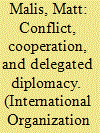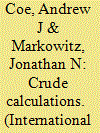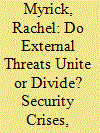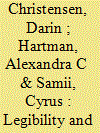|
|
|
Sort Order |
|
|
|
Items / Page
|
|
|
|
|
|
|
| Srl | Item |
| 1 |
ID:
181671


|
|
|
|
|
| Summary/Abstract |
Although rebel groups are players on the international stage, little is known about their financial strategies at this scale. Existing research suggests that rebels succeed in cross-border trade by using informal networks that evade state authority. Yet rebels face a critical challenge: they operate in a normative environment that values state recognition and penalizes their illegitimate status. New evidence reveals that rebels can overcome this barrier and better connect to global economies not by evading the state but by infiltrating its institutions. Drawing on unprecedented data—the internal records of armed groups and their trading partners—I examine how rebels use state agencies in conflict zones to manufacture a legal cover for wartime trade. By using state agencies to provide false certification, rebels can place the stamp of state on their trade deals. This strategy of legal appropriation is a fundamentally different model of how conflict markets skirt sanctions and connect to global buyers. I develop a framework for how this strategy works that traces how international sovereignty norms and sanctions regimes create incentives for rebels, firms, and bureaucrats to coordinate around this legal veneer across the supply chain. The framework and evidence contribute theoretical and policy understandings for rebel governance, state building and fragmentation, and illicit global markets.
|
|
|
|
|
|
|
|
|
|
|
|
|
|
|
|
| 2 |
ID:
181668


|
|
|
|
|
| Summary/Abstract |
Does diplomacy affect the prospects of international conflict and cooperation? Systematic empirical assessment has been hindered by the inferential challenges of separating diplomacy from the distribution of power and interests that underlies its conduct. This paper addresses the question of diplomacy's efficacy by examining the intragovernmental politics of US foreign policy, and the varying influence of diplomatic personnel in the policy process. I claim that diplomats hold the strongest preferences for cooperative relations with their host countries, relative to other participants in the foreign policy process. They also exert substantial influence over the formation and implementation of US policies toward their host countries but their influence is intermittently weakened by the short-term shock of an ambassadorial turnover. As a result, when ambassadors are removed from post, diplomacy is more likely to be eschewed for more conflictual means of settling international disagreements, and opportunities for economic exchange are less likely to be realized. I test this theory using newly collected data on US diplomatic representation, for the global sample of countries from 1960 through 2014. To address concerns of diplomatic staffing being endogenous to political interests, I leverage a natural experiment arising from the State Department's three-year ambassadorial rotation system. The turnover of a US ambassador causes a decrease in US exports to the country experiencing the turnover, and heightens the risk of onset of a militarized dispute between that country and the US. These findings point to bureaucratic delegation as an important but overlooked determinant of macro-level international outcomes.
|
|
|
|
|
|
|
|
|
|
|
|
|
|
|
|
| 3 |
ID:
181669


|
|
|
|
|
| Summary/Abstract |
For many centuries, conquest was commonplace, and its attractiveness was central to the character of international politics. Why has it declined? Existing theories cannot explain why powerful countries no longer conquer states with easily extractable wealth. We develop an explanation based on the relationship between a potential conqueror's economic productivity and its ability to profit from conquest. Productivity has opposing effects on conquest's profitability: it raises the opportunity cost of each asset diverted to conquest, but also reduces the quantity of assets required for conquest. The net effect is determined by the composition of investment in innovation. We document that since at least 1950 investment has been predominantly aimed at civilian, not military innovations, so that rising productivity should reduce conquest's net profitability. Using cost analyses of comparable wars, we estimate bounds on the profitability of conquering the oil and gas reserves of the Persian Gulf, a very tempting target, for the United States and Iraq, two potential conquerors of widely differing productivity. Though both mechanisms operate, we find that the net effect of higher productivity is to reduce the profits from conquest. Moreover, this net effect is large enough to render conquest generally unprofitable for contemporary high-productivity states.
|
|
|
|
|
|
|
|
|
|
|
|
|
|
|
|
| 4 |
ID:
181667


|
|
|
|
|
| Summary/Abstract |
How will advances in digital technology affect the future of human rights and authoritarian rule? Media figures, public intellectuals, and scholars have debated this relationship for decades, with some arguing that new technologies facilitate mobilization against the state and others countering that the same technologies allow authoritarians to strengthen their grip on power. We address this issue by analyzing the first game-theoretic model that accounts for the dual effects of technology within the strategic context of preventive repression. Our game-theoretical analysis suggests that technological developments may not be detrimental to authoritarian control and may, in fact, strengthen authoritarian control by facilitating a wide range of human rights abuses. We show that technological innovation leads to greater levels of abuses to prevent opposition groups from mobilizing and increases the likelihood that authoritarians will succeed in preventing such mobilization. These results have broad implications for the human rights regime, democratization efforts, and the interpretation of recent declines in violent human rights abuses.
|
|
|
|
|
|
|
|
|
|
|
|
|
|
|
|
| 5 |
ID:
181665


|
|
|
|
|
| Summary/Abstract |
A common explanation for the increasing polarization in contemporary American foreign policy is the absence of external threat. I identify two mechanisms through which threats could reduce polarization: by revealing information about an adversary that elicits a bipartisan response from policymakers (information mechanism) and by heightening the salience of national relative to partisan identity (identity mechanism). To evaluate the information mechanism, study 1 uses computational text analysis of congressional speeches to explore whether security threats reduce partisanship in attitudes toward foreign adversaries. To evaluate the identity mechanism, study 2 uses public opinion polls to assess whether threats reduce affective polarization among the public. Study 3 tests both mechanisms in a survey experiment that heightens a security threat from China. I find that the external threat hypothesis has limited ability to explain either polarization in US foreign policy or affective polarization among the American public. Instead, responses to external threats reflect the domestic political environment in which they are introduced. The findings cast doubt on predictions that new foreign threats will inherently create partisan unity.
|
|
|
|
|
|
|
|
|
|
|
|
|
|
|
|
| 6 |
ID:
181670


|
|
|
|
|
| Summary/Abstract |
We address a debate over the effects of private versus customary property rights on external investment. Despite political economists’ claims that external investors favor private property rights, other experts argue that customary systems enable large-scale “land grabs.” We organize these competing claims, highlighting trade-offs due to differences in legibility versus the ability to displace existing landholders under both systems. We study a natural experiment in Liberia, where law codifies parallel private and customary property rights systems. We use this institutional boundary and difference-in-differences methods to isolate differential changes in external investment under the different property rights systems following the global food crisis of 2007–08. We find a larger increase in land clearing where private property rights prevailed, with such clearing related to more concession activity. Qualitative study of a palm oil concession reveals challenges external investors confront when navigating customary systems.
|
|
|
|
|
|
|
|
|
|
|
|
|
|
|
|
| 7 |
ID:
181672


|
|
|
|
|
| Summary/Abstract |
International organizations (IOs) increasingly pool resources and expertise. Under what conditions do they pool rather than compete when their activities overlap? Drawing on elite interviews, I argue that even though many cooperation decisions are made by staff possessing high degrees of autonomy from member state principals, IOs are more likely to pool resources when their leading stakeholders are geopolitically aligned. Regardless of whether member states directly oversee the negotiation of these arrangements, staff design policies that are amenable to major stakeholders. I test this argument with regression analysis of an original data set that documents patterns of co-financing and information sharing among IOs in the development issue area. I further supplement these tests with an elite survey experiment deployed via LinkedIn to bureaucrats from various development IOs. Across the board, I find evidence consistent with my theory.
|
|
|
|
|
|
|
|
|
|
|
|
|
|
|
|
| 8 |
ID:
181666


|
|
|
|
|
| Summary/Abstract |
What motivates politicians and political parties to shift their positioning on an issue? Focusing on the case of trade policy in countries with advanced economies and plurality electoral systems, I argue that the relative positioning of parties on an existing issue can change even when the preferences of the key actors (voters and politicians) are held constant, and even when party leaders continue to represent the same constituencies. In advanced plurality countries, college-educated voters support free trade, and high-density constituencies are predominantly represented by Left incumbents. As college-educated workers migrate to high-density constituencies in pursuit of higher wages, Left incumbents increasingly embrace free trade, while Right incumbents take more protectionist positions. I provide empirical support for several observable implications of my theory.
|
|
|
|
|
|
|
|
|
|
|
|
|
|
|
|
|
|
|
|
|